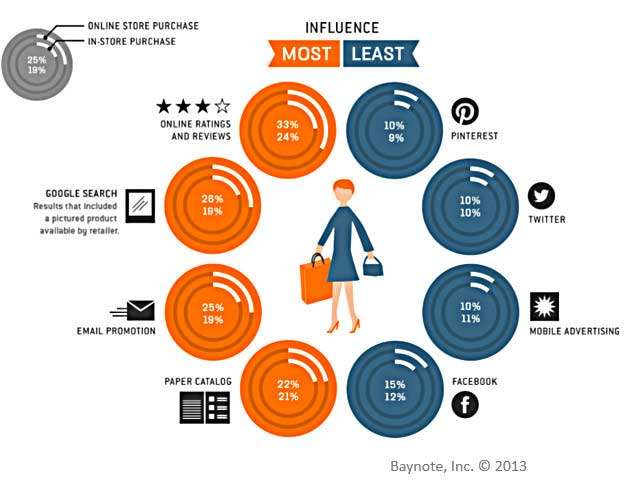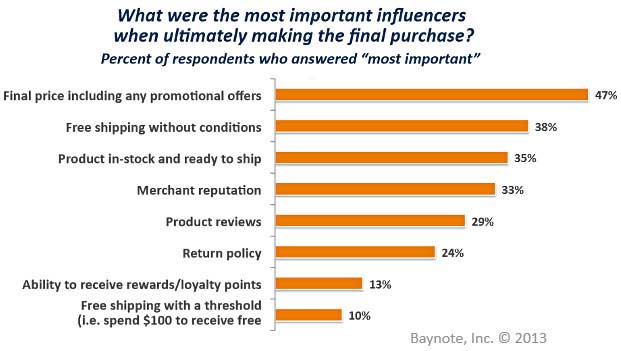Although online channels such as ratings and reviews, search results, and email promotions influence online shoppers' purchases most, traditional paper catalogs also hold sway, according to a survey from Baynote and the e-tailing group. Meanwhile, social networking sites are the least effective channel for influencing shoppers whether they are making purchases in-store or online.
Below, additional findings Baynote's survey of smartphone-owning online shoppers, conducted during the 2012 holiday shopping season.
Among online shoppers surveyed, online ratings and reviews were cited as the most influential source of information when making online (33%) and in-store purchases (24%). Search results via Google were the second most influential source of information for online and in-store purchases (26% and 19%, respectively), followed by email promotions (25% and 19%, respectively).

Even so, people still love their paper catalogs: 22% of smartphone owners cited print catalogs as the most influential source of information when making online purchases, and 21% cited paper catalogs for in-store purchases.
By contrast, social media sites exert less influence over purchases.
Across popular social networking sites, Facebook had the most influence whether buying online (15%) or in stores (12%). Pinterest and Twitter were nearly tied for second place.
Meanwhile, roughly 1 in 10 online shoppers cited mobile ads as most influential when making online (10%) and in-store (11%) purchases.
Making the Final Purchase
Ultimately, cost matters most to people: 47% of online shoppers cited price as the ultimate influencer for making a final purchase, while 38% cited free shipping.

However, in the hyper-competitive retail market, factors such as the availability of a product (35%), merchant reputation (33%), product reviews (29%), and return policy (24%) still sway buyers.
Tablets vs. Smartphones
During the 2012 holiday season, consumers favored tablets over smartphones when browsing, shopping, and transacting online:
- 65% of tablet owners used their device to browse websites in advance of buying vs. 50% of smartphone owners who did so.
- 62% of tablet owners used their device to compare prices before a store visit vs. 49% of smartphone owners who did so.
- 57% of tablet owners used their device to make a purchase on a website vs. 43% of smartphone owners who did so.
- 51% of tablet owners used their device to get coupons and offers vs. 46% of smartphone owners who did so.
About the data: Findings are based on a survey of 1,000 consumers fielded by the e-tailing group for Baynote, Nov. 24 to Dec. 5, 2012. Respondents had shopped online more than four times in the previous year, spending $250+ annually. All respondents owned a smartphone and 55% owned a tablet.




